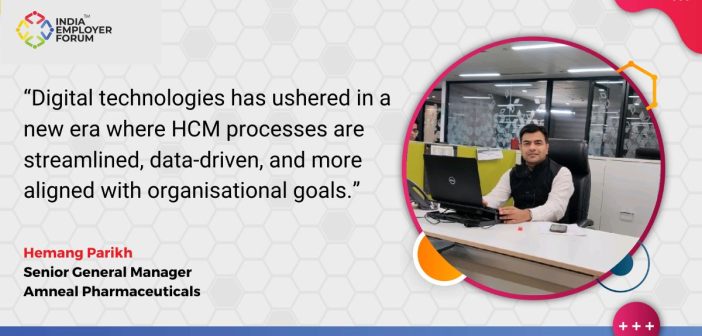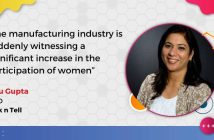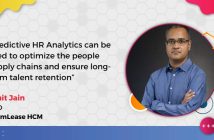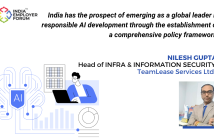By Hemang Parikh, Senior General Manager, Amneal Pharmaceuticals
In today’s fast-paced business landscape, the role of technology in Human Capital Management (HCM) is more critical than ever. As organisations strive to stay competitive and adapt to evolving workforce dynamics, integrating advanced technological solutions into HCM strategies has become a game-changer. This transformation is not just about automating tasks but about reimagining the entire employee lifecycle from recruitment to retirement.
The Evolution of Human Capital Management
Human Capital Management encompasses a broad range of activities, including recruiting, onboarding, employee development, performance management, and succession planning. Traditionally, these processes were manual, time-consuming, and often plagued with inefficiencies. The advent of digital technologies has ushered in a new era where HCM processes are streamlined, data-driven, and more aligned with organisational goals.
Key Technological Innovations in HCM
- Artificial Intelligence and Machine Learning: AI and ML are transforming how organisations manage their human resources. From predictive analytics that forecast hiring needs to chatbots that enhance employee engagement, these technologies offer unprecedented insights and automation. For instance, AI-powered tools can analyse vast amounts of candidate data to identify the best fit for a role, significantly reducing the time and bias in the recruitment process.
- Cloud Computing and SaaS Solutions: Cloud-based HCM platforms provide scalable, flexible, and cost-effective solutions for managing HR functions. These systems enable real-time access to employee data, facilitate remote work, and ensure seamless integration across various HR processes. Some companies have set the benchmark with their comprehensive HCM suites that support everything from payroll to talent management.
- HR Analytics and Big Data: Leveraging big data and HR analytics, organisations can make informed decisions regarding their workforce. By analysing patterns in employee performance, engagement, and turnover, businesses can identify areas for improvement and develop targeted strategies to enhance employee satisfaction and retention. For example, data-driven insights can reveal the correlation between employee training programs and productivity levels.
- Mobile Technology and Apps: Mobile technology has made HCM accessible anytime, anywhere. Mobile apps for HR tasks—such as leave management, performance reviews, and learning modules—empower employees to manage their HR-related activities on the go. This flexibility is particularly valuable in the current hybrid work environment where accessibility and convenience are paramount.
- Blockchain and Data Security: Blockchain technology promises to revolutionise HCM by enhancing data security and transparency. It can provide a tamper-proof record of employee credentials, simplifying background checks and ensuring the integrity of HR data. This is especially crucial in maintaining trust and compliance in an era where data breaches are increasingly common.
The Impact of Technology on Employee Experience
At the heart of effective Human Capital Management is the employee experience. Technology plays a pivotal role in creating a workplace that attracts, retains, and motivates top talent.
- Personalised Learning and Development: AI-driven learning platforms offer customised training programs that align with individual career paths and company goals. This personalisation fosters continuous learning and development, critical for employee growth and satisfaction.
- Enhanced Engagement and Communication: Digital tools facilitate better communication and collaboration among employees, regardless of their location. Platforms like Slack and Microsoft Teams enable instant messaging, video conferencing, and collaborative project management, enhancing overall employee engagement.
- Streamlined Processes: Automation reduces the administrative burden on HR teams and employees alike, freeing them to focus on strategic activities. Automated workflows for tasks like onboarding and performance reviews ensure consistency and efficiency, improving the overall HR experience.
- Integrated HCM Technology platforms: These platforms offer comprehensive visibility into the diverse opportunities available within an organisation. By leveraging these insights, employees can explore various career paths, facilitating both horizontal moves to broaden their skill sets and vertical advancements to climb the organisational ladder. This holistic approach not only empowers employees to take charge of their career growth but also helps organisations retain and nurture talent by aligning individual aspirations with business goals.
Challenges and Considerations
While the benefits of technology in HCM are vast, organisations must navigate several challenges to realise its full potential. Data privacy and security concerns, the need for ongoing system integration, and the requirement for continuous training and support are critical considerations. Moreover, organisations must ensure that technology enhances rather than replaces the human touch in HR, maintaining the balance between digital efficiency and personal connection.
The Future of HCM Technology
As we look to the future, the role of technology in Human Capital Management will continue to expand. Emerging trends such as the use of virtual reality for immersive training, the integration of IoT for employee wellness, and the adoption of augmented analytics for deeper workforce insights will further redefine how companies manage their human capital.
Organisations that embrace these technological advancements will be well-positioned to cultivate a dynamic, agile, and high-performing workforce, driving sustained success in the competitive global market.
In Summary: The integration of technology in Human Capital Management is not merely an operational upgrade but a strategic imperative. By leveraging cutting-edge technologies, businesses can optimise their HR processes, enhance employee experience, and ultimately achieve their organisational goals. As we move forward, the synergy between technology and human capital will be the cornerstone of successful, future-ready enterprises.
About Hemang Parikh
Hemang Parikh is a seasoned HR professional with over 18 years of diverse experience, currently serving as the Head of HR Automations and HR Operations while also leading corporate business partner HR function at Amneal Pharmaceuticals for their India Operations. Throughout his career, he has demonstrated expertise across multiple HR functions, including Talent Acquisition, HR Operations, Talent Management, HR Technology & Automations, Learning & Development and Compensation & Benefits.
Hemang holds a PGDBM from Emeritus and an MBA – HR from Pondicherry university. With a professional journey that includes roles at prestigious organisations such as Adani Group, Vodafone, and Bharti Airtel. Hemang is known for his strategic vision, operational excellence, and commitment to driving organisational success through effective HR practices.




